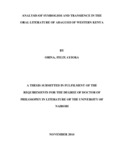| dc.description.abstract | It is frequently argued that the oral artist has no control over his material, and, therefore, no
raw material to work on since everything is handed down to him/her. Much as the argument
may not be dismissed off-hand, we aim to argue that both the language and the content of oral
texts are audience and context specific, thus giving the artist some degree of control over and
some room to decide—consciously or otherwise—what to say to and do for their audiences.
We are further, disputing charges that either disassociate mainstream linguistic devices from
modern oral literature, or, worse still, limit stylistic devices to racial or ethnic specificities
instead of treating them as part of universal literary parallels. It is therefore important to call
into question the meeting point between symbolism and the contexts of performance. The
questions we are asking include: What is the nature and role of symbols in the oral literature
of Abagusii? Is the use of symbols static or transient? Does transience identify a thread that
runs through earlier representations into the contemporary? What is constant and what are the
variables? Furthermore, the study is comparative in nature and employs the tenets of the
theories of semiotics, phenomenology, hermeneutics and feminism to show that symbolism is
prominently present both in the traditional oral literature of Abagusii, and in the community’s
modern oral forms, and that while the indigenous forms reflected the traditional order that
was based on the stringent hierarchical order that set out strict gender roles, and which was
reinforced by a moral order that distinguished good from evil, the contemporary oral
literature is influenced by such contemporary influences as Christianity, urbanisation
resulting in popular tendencies and more uninhibited lifestyles. Amid the change, however,
the old forms remain in the background as some form of cultural/artistic legacy. The study
should then lead to further questions on the effect on globalisation as well as new systems of
governance on African oral literature | en_US |

